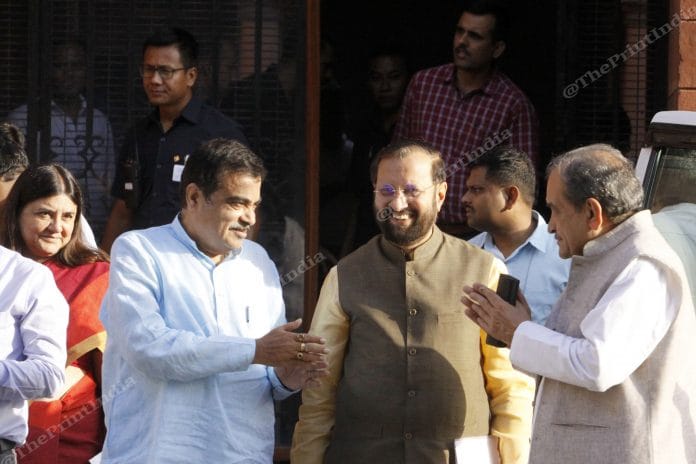New Delhi: Prakash Javadekar, 68, is set to return for a second stint in the information & broadcasting (I&B) ministry, an important portfolio that enjoys special significance under Prime Minister Narendra Modi, a leader known to be conscious of his own as well as his government’s image.
Javadekar, a Rajya Sabha member from Maharashtra, had earlier served as I&B Minister in the early days of the preceding Modi administration, which saw the ministry shift hands several times, from senior leaders of the Cabinet such as Venkaiah Naidu, Ravi Shankar Prasad, Javadekar, and Arun Jaitley to first-timers Smriti Irani and Rajyavardhan Singh Rathore.
The I&B ministry is seen as the face of the government, and this is why it has more often than not been overseen by top leaders, including former Prime Minister Indira Gandhi and BJP veteran L.K Advani.
The road ahead
The ministry under Modi 2.0 has already planned a new policy to regulate the broadcast sector, besides one on a “media communication policy”.
It is also likely to take forward the Newspapers and Publications Bill, which seeks to replace the Press and Registration of Books Act (PRB), 1867, and a fresh law to replace the archaic Cinematograph Act, 1952.
While the former was ready before it was put into cold storage, the second was in the industry consultation stage, with talks revolving around the recommendations of the Shyam Benegal committee to revamp the censor board.
The ministry is also likely to start fresh work on amending the Prasar Bharati Act, 1990, and the outdated Cable TV Act, which have been unable to handle the emerging challenges in the broadcast sector, including platform channels (the channels operated by DTH operators), on which NaMo TV rode before the polls.
Regulating the growing number of online media platforms, such as digital news outlets and OTT (over the top) services such as Netflix and Amazon Prime — which are currently out of any regulatory framework — will also be on the agenda of the new government.
Among other things, the ministry will work on ease of doing business for filmmakers and private television broadcasters.
In the next five years, the ministry is also set to leverage the reach of DD and AIR to take programming to special areas and regions such as the northeast and Jammu & Kashmir, besides to youths, farmers and women. The launch of DD’s international channel, “DD World”, meant to project the government’s views at a global level, is also on the cards.
There’ll be special focus on social media — on examining its functioning as well as strengthening the government’s presence on it. A policy on social media advertising may be in the offing too.
Two more Indian Institute of Mass Communication campuses are likely to come up in Jammu and Aizawl, with a Film & Television Institute of India branch planned in Arunachal Pradesh.
Also read: Full list of ministers in the Modi govt in order of their oath-taking
The journey so far
Over the past five years, despite some major controversies, the ministry has been largely successful in maintaining a good image of the Modi government and curbing negative publicity to a large extent.
Besides, through the regulation of information flow, this has also been possible through extensive media and public sentiment analysis and regular feedback through various media units under the ministry.
Two controversial proposals, to strip journalists “propagating fake news” of their PIB accreditation and grant of chip-based cards to accredited journalists — were junked.
An important step was the initiation, in 2015, of efforts to expand the private FM radio network through e-auction of frequencies.
The ministry was also instrumental in publicising several flagship events of the Modi government, such as International Yoga Day and Surgical Strike Day, the latter meant to commemorate the Indian Army’s 2016 cross-border strike on terrorist launchpads.
The ministry initiated a manpower audit of Prasar Bharati, besides reforms to revamp Doordarshan and All India Radio. These include the “slot sale policy” to get fresh content on DD, and the DD free dish policy to earn more revenues.
While the first was junked at the last moment by Irani — which also got DD into litigation — the second was put on hold by her but later revived under Rathore.
Also read: New Modi govt — Amit Shah, Jaishankar in, Sushma, Maneka & Rathore out






